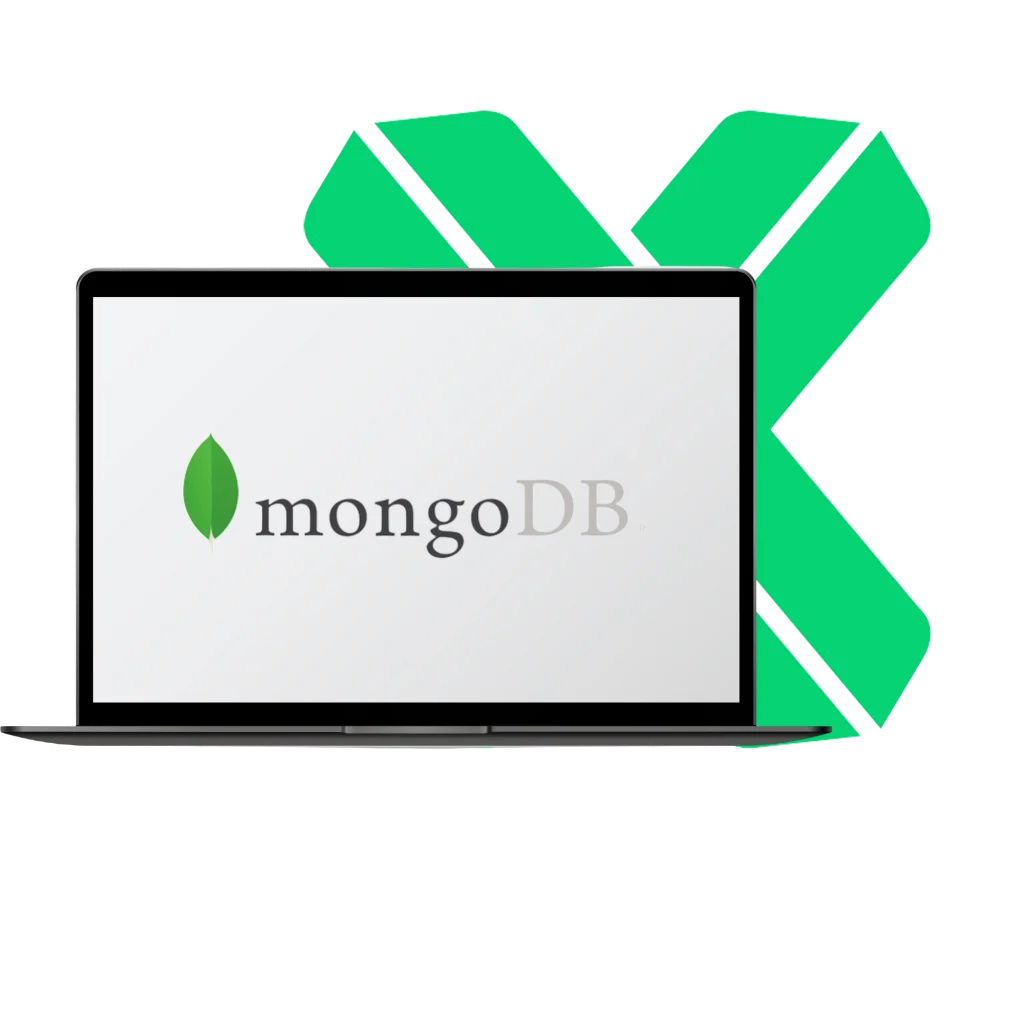MONGODB DEVELOPMENT COMPANY
Expand your MongoDB database capabilities with nearshore talent.
Our MongoDB development services power flexible, scalable, and high-performance NoSQL database solutions. We quickly assemble skilled teams, allowing you to deliver robust, optimized databases for modern applications with speed and efficiency.

+200 companies rely on
our 1% Top Talent

MongoDB Development Services We Provide
We offer versatile MongoDB development services, from database design and optimization to cloud integration and performance tuning. Explore our key offerings below:
Custom MongoDB Database Design
We design custom MongoDB databases tailored to your specific business needs. Our architects create optimized schemas for flexible and scalable data storage, ensuring your applications handle large volumes of unstructured data with ease.
MongoDB Performance Tuning
Our experts analyze and optimize your MongoDB databases for peak performance. We improve query performance, configure indexes, and optimize database configurations to ensure your databases perform efficiently even under heavy workloads.
MongoDB Database Migration
We handle seamless migrations from relational databases or other NoSQL solutions to MongoDB. Our team ensures data integrity and minimal downtime during migrations, enabling you to leverage MongoDB’s flexibility and scalability.
MongoDB Replication and Sharding
We implement MongoDB’s replication and sharding features to enhance scalability, availability, and fault tolerance. Our solutions ensure that your database remains highly available, with data distributed across multiple servers for faster access.
MongoDB Atlas Cloud Integration
We deploy and manage MongoDB databases on the cloud using MongoDB Atlas. Our cloud integration services ensure that your MongoDB infrastructure is scalable, secure, and optimized for real-time data access across cloud environments.
MongoDB Maintenance and Support
Keep your MongoDB databases running at peak performance with our ongoing maintenance and support services. We handle regular updates, backups, performance monitoring, and troubleshooting to ensure database reliability and efficiency.
Why Choose Xpertsoft for MongoDB Development
Nearshore Expertise
Our software developers are primarily based in Portugal, ensuring smooth collaboration with EU-based clients. With real-time communication and bilingual professionals, we provide seamless support and development services.
Broad Technical Expertise
Beyond MongoDB, our team brings expertise in NoSQL databases, cloud integration, microservices, and application development. We offer comprehensive solutions to build, scale, and maintain flexible, high-performance databases.
Tailored Development Solutions
We provide flexible MongoDB development services that align with your business goals. Whether you need a single NoSQL expert or an entire team, we adapt to your needs and scale our involvement to fit your project requirements.
The MongoDB Ecosystem We Used in Previous Work
Database Management and Development
Leverage MongoDB’s features for building robust NoSQL databases:
- MongoDB 4.0+
- MongoDB Atlas (cloud-hosted)
- BSON (Binary JSON data storage)
- Document-based data modeling
Database Optimization and Performance
Optimize MongoDB’s performance and scalability with these tools:
- Indexing Strategies (single-field, compound, geospatial)
- Aggregation Framework (for complex data queries)
- MongoDB Profiler (for query performance monitoring)
- WiredTiger Storage Engine (for performance and compression)
Backup and Recovery Solutions
Ensure data security with reliable backup and disaster recovery strategies:
- MongoDB Atlas Backup
- MongoDB Oplog (for replication-based backups)
- Point-In-Time Recovery (PITR)
- Data Encryption (in transit and at rest)
Security and Compliance
Secure your MongoDB environment with these features:
- Role-Based Access Control (RBAC)
- SSL/TLS Encryption (for secure data transmission)
- Field-Level Encryption (for sensitive data protection)
- Auditing and Logging (for security monitoring)
Cloud Integration and Hosting
Deploy MongoDB databases on leading cloud platforms:
- MongoDB Atlas (fully managed cloud service)
- AWS (Amazon Web Services)
- Google Cloud Platform (GCP)
- Microsoft Azure (for MongoDB integration)
Monitoring and Maintenance
Maintain MongoDB performance and availability with these tools:
- MongoDB Compass (for database management)
- Prometheus and Grafana (for monitoring metrics)
- Ops Manager (for on-premise MongoDB monitoring)
- Automated Backups and Disaster Recovery
Key Facts to Know About MongoDB Development
- Benefits of using MongoDB
-
1. Flexible Schema for Unstructured Data
MongoDB’s document-oriented NoSQL model allows for flexible schema designs, making it ideal for handling unstructured and semi-structured data such as JSON-like documents. This flexibility is especially valuable for applications that require frequent schema changes or deal with diverse data types.
2. Horizontal Scalability with Sharding
MongoDB supports horizontal scaling through sharding, allowing you to distribute large datasets across multiple servers. This enables high performance and availability, even as data grows exponentially, making MongoDB a perfect choice for large-scale applications.
3. Cloud-Ready NoSQL Database
MongoDB integrates seamlessly with cloud services like AWS, GCP, and Azure, with MongoDB Atlas offering fully managed cloud solutions. This allows businesses to easily deploy, scale, and manage databases in the cloud with minimal overhead and maximum flexibility.
- MongoDB is primarily used for
-
MongoDB is primarily used for managing unstructured data in modern applications, such as e-commerce platforms, real-time analytics, IoT solutions, and content management systems (CMS). Its flexibility makes it ideal for applications that require dynamic schemas or large-scale data processing.
- Reasons for MongoDB's popularity
-
- Document-Based Model: MongoDB’s document-based structure allows developers to store complex data in a flexible, JSON-like format (BSON), simplifying application development for projects with evolving data requirements.
- Full-Text Search and Geospatial Queries: MongoDB supports advanced features like full-text search and geospatial queries, making it a powerful tool for applications that need complex data indexing and retrieval.
- Cross-Platform Compatibility: MongoDB works seamlessly on various operating systems, including Windows, Linux, and macOS, ensuring flexibility in development and deployment environments.
- Rich Ecosystem of Tools and Integrations: MongoDB provides a robust ecosystem with tools such as MongoDB Compass for GUI-based database management, as well as integration with data analytics tools, including Apache Spark and Hadoop.
- Real-Time Data Processing: MongoDB excels at real-time data ingestion and processing, making it ideal for modern applications that require immediate insights, such as live data feeds, event logging, and recommendation systems.
- Strong Community and Enterprise Support: MongoDB is backed by a strong developer community and offers commercial support through MongoDB, Inc., ensuring continuous updates, new features, and security improvements.
- Useful Links
-
1. Flexible Schema for Unstructured Data
MongoDB’s document-oriented NoSQL model allows for flexible schema designs, making it ideal for handling unstructured and semi-structured data such as JSON-like documents. This flexibility is especially valuable for applications that require frequent schema changes or deal with diverse data types.
2. Horizontal Scalability with Sharding
MongoDB supports horizontal scaling through sharding, allowing you to distribute large datasets across multiple servers. This enables high performance and availability, even as data grows exponentially, making MongoDB a perfect choice for large-scale applications.
3. Cloud-Ready NoSQL Database
MongoDB integrates seamlessly with cloud services like AWS, GCP, and Azure, with MongoDB Atlas offering fully managed cloud solutions. This allows businesses to easily deploy, scale, and manage databases in the cloud with minimal overhead and maximum flexibility.
MongoDB is primarily used for managing unstructured data in modern applications, such as e-commerce platforms, real-time analytics, IoT solutions, and content management systems (CMS). Its flexibility makes it ideal for applications that require dynamic schemas or large-scale data processing.
- Document-Based Model: MongoDB’s document-based structure allows developers to store complex data in a flexible, JSON-like format (BSON), simplifying application development for projects with evolving data requirements.
- Full-Text Search and Geospatial Queries: MongoDB supports advanced features like full-text search and geospatial queries, making it a powerful tool for applications that need complex data indexing and retrieval.
- Cross-Platform Compatibility: MongoDB works seamlessly on various operating systems, including Windows, Linux, and macOS, ensuring flexibility in development and deployment environments.
- Rich Ecosystem of Tools and Integrations: MongoDB provides a robust ecosystem with tools such as MongoDB Compass for GUI-based database management, as well as integration with data analytics tools, including Apache Spark and Hadoop.
- Real-Time Data Processing: MongoDB excels at real-time data ingestion and processing, making it ideal for modern applications that require immediate insights, such as live data feeds, event logging, and recommendation systems.
- Strong Community and Enterprise Support: MongoDB is backed by a strong developer community and offers commercial support through MongoDB, Inc., ensuring continuous updates, new features, and security improvements.
Add top 1% devs to
your in-house teams
Tap into the expertise of our top 1% developers. Staff augmentation lets you boost your in-house teams with specialized experts. Expedite timelines without sacrificing output quality.
Here’s how we augment your team

STEP 1
Discovery Call
Share your requirements, budget, and necessary skill sets. We will draft a working timeline and select top developers for your team.
STEP 2
Assembling Your Team
Withindays, we’ll find suitable developers that fit your requirements. We ensure they have the right technical expertise and would be a great cultural fit for your team.
STEP 3
Onboarding and Scaling
After onboarding them, our developers will integrate with your team. Scale your engagement as needed – we’re happy to accommodate your demands.
Get an
entire Team
Looking to bring on more than just a few .NET developers? We’ll assemble a complete crew to support you. Whether it’s full-cycle front and back-end web development, QA, DevOps, UX/UI, or something else. Monitor the team’s performance and manage them as you see fit.
Here’s how you can get a dedicated team

STEP 1
Discovery Call
We’ll learn about your business, organization structure, objectives, budget, timelines, and resource requirements. Then, we can start identifying the ideal talent for you.
STEP 2
Team Assembly and Integration
Once we assemble your dedicated team, we’ll ensure a smooth transition as they integrate with your organization.
STEP 3
Project Kickoff
After onboarding, your team is at your disposal. You’ve now acquired the resources you need without the hassle and high cost that usually comes with recruitment
